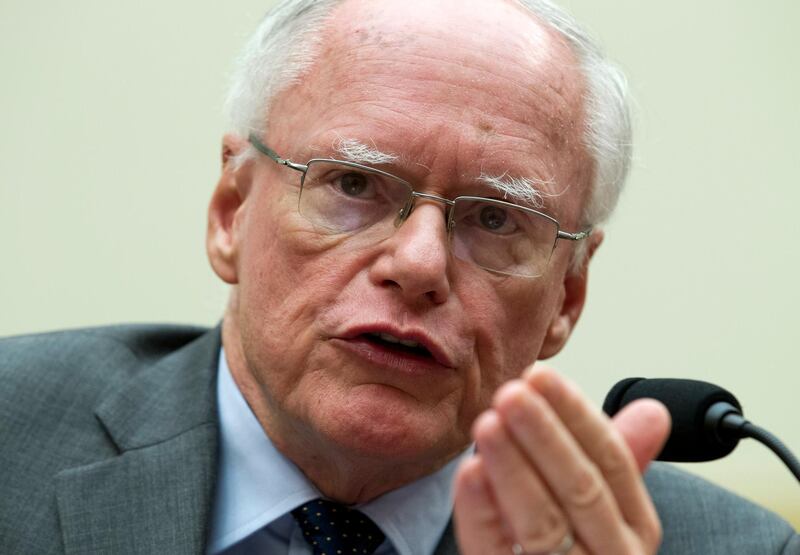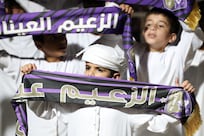The terror groups ISIS and Al Qaeda remain a global threat, US officials said, with the latter quietly rebuilding itself as the world focused on wresting back territory seized by the former.
James Jeffrey, US envoy to the international coalition fighting ISIS, said that despite losing the once vast territory it held in Syria and Iraq, the risk remained of attacks by underground cells and an expansion of the militants into new areas.
Thousands of the extremist organisation's fighters are scattered around Syria and Iraq, where officials see a "persistent, resilient, rural terrorist level of violence", Mr Jeffrey said at a State Department briefing on Thursday.
Special Envoy for the Global @Coalition to Defeat ISIS Ambassador James F. Jeffrey provides an update on the Coalition's efforts to defeat ISIS in #Syria, #Iraq, and across the globe. pic.twitter.com/R3MJRUqh9z
— Department of State (@StateDept) August 1, 2019
The US-backed Syrian Democratic Forces ousted ISIS militants from the last piece of their self-declared caliphate earlier this year. But "the ISIS brand lives on around the world", said State Department counterterrorism co-ordinator Nathan Sales said as he joined Mr Jeffrey to provide an update on the fight against the group.
"ISIS branches and networks now span the African continent from east to west and north to south," Mr Sales said. "They've increased the lethality of their attacks, they've expanded into new areas, and they've repeatedly targeted US interests."
Mr Sales said the US was urging countries to take back and prosecute foreign fighters who flocked by the thousands to Iraq and Syria to join ISIS.
"Across the coalition, we need to prosecute ISIS leaders, fighters, financiers, and facilitators for the crimes they've committed," he said. "That includes building the law enforcement capacity of partner states that have the will to act but might lack the resources or expertise to do so. It also means repatriating and prosecuting foreign terrorist fighters."
Counterterrorism Coordinator Ambassador Nathan A. Sales provides additional updates on the @Coalition's efforts to defeat ISIS. pic.twitter.com/T9QdDggoNn
— Department of State (@StateDept) August 1, 2019
Mr Sales said the threat from Al Qaeda and its affiliates remained as strong as ever after the terrorist group rebuilt itself while the US and other nations focused on destroying ISIS.
“Al Qaeda has been strategic and patient over the past several years. It’s let ISIS absorb the brunt of the world’s counterterrorism efforts while patiently reconstituting itself," he said.
“We see active and deadly Al Qaeda affiliates across the globe, including in Somalia, where Al Shabab commits regular attacks inside Somalia and also has begun to attack its neighbours as well, particularly Kenya,” Mr Sales said.
Al Qaeda is also present in Yemen, where it has taken advantage of instability created by the country's civil war to expand its operations. The US considers the Yemen-based branch, known as Al Qaeda in the
Arabian Peninsula (Aqap) as the deadliest branch of the terror group and has conducted frequent strikes against its members. Since the civil war broke out in 2015, the US efforts have been supplemented by the Saudi-led coalition supporting the government against Iran-backed rebels. Yemeni forces trained by the UAE have been conducting operations against Al Qaeda in government-controlled southern Yemen but the group still manages to stage attacks such as a raid on an army camp in Abyan province on Friday that killed at least 19 soldiers.
The US assessment of Al Qaeda’s strength runs counter to the general perception that the group was more isolated and under pressure since the killing of its founder Osama bin Laden in 2011. On Wednesday, US media reported that Osama bin Laden’s son Hamza, considered a possible heir apparent to the Al Qaeda leadership, was killed at some point in the past two years.
“No one should mistake the period of relative silence from Al Qaeda as an indication that they’ve gotten out of the business,” Mr Sales said. “They are very much in this fight and we need to continue to take the fight to them.”







